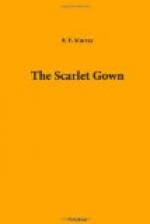‘Now something to eat, for the train is late.’
(Three currants in a bun)
She brought him a bun on a greasy plate.
(And the bun was baked a week ago.)
He left the bun, and he left the tea,
(Three currants in a bun)
She charged him a shilling and let him be,
And the train went on at a quarter to three.
(And the bun is old and weary.)
A December day
Blue, blue is the sea to-day,
Warmly the light
Sleeps on St. Andrews Bay—
Blue, fringed with white.
That’s no December sky!
Surely ’tis June
Holds now her state on high,
Queen of the noon.
Only the tree-tops bare
Crowning the hill,
Clear-cut in perfect air,
Warn us that still
Winter, the aged chief,
Mighty in power,
Exiles the tender leaf,
Exiles the flower.
Is there a heart to-day,
A heart that grieves
For flowers that fade away,
For fallen leaves?
Oh, not in leaves or flowers
Endures the charm
That clothes those naked towers
With love-light warm.
O dear St. Andrews Bay,
Winter or Spring
Gives not nor takes away
Memories that cling
All round thy girdling reefs,
That walk thy shore,
Memories of joys and griefs
Ours evermore.
A college career
I
When one is young and eager,
A bejant and a boy,
Though his moustache be meagre,
That cannot mar his joy
When at the Competition
He takes a fair position,
And feels he has a mission,
A talent to employ.
With pride he goes each morning
Clad in a scarlet gown,
A cap his head adorning
(Both bought of Mr. Brown);
He hears the harsh bell jangle,
And enters the quadrangle,
The classic tongues to mangle
And make the ancients frown.
He goes not forth at even,
He burns the midnight oil,
He feels that all his heaven
Depends on ceaseless toil;
Across his exercises
A dream of many prizes
Before his spirit rises,
And makes his raw blood boil.
II
Though he be green as grass is,
And fresh as new-mown hay
Before the first year passes
His verdure fades away.
His hopes now faintly glimmer,
Grow dim and ever dimmer,
And with a parting shimmer
Melt into ‘common day.’
He cares no more for Liddell
Or Scott; and Smith, and White,
And Lewis, Short, and Riddle
Are ‘emptied of delight.’
Todhunter and Colenso
(Alas, that friendships end so!)
He curses in extenso
Through morning, noon, and night.
No more with patient labour
The midnight oil he burns,
But unto some near neighbour
His fair young face he turns,
To share the harmless tattle
Which bejants love to prattle,
As wise as infant’s rattle
Or talk of coots and herns.




